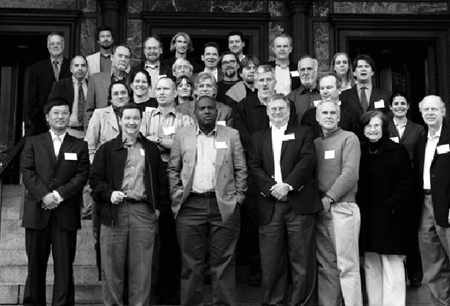Databases, Data Access and Data-Sharing in Paleoanthropology
Date
Apr 20-22, 2007Organized by
Eric Delson and Steve FrostLocation
American Museum of Natural History, New York, NYParticipants
- Leslie Aiello Wenner-Gren Foundation, USA
- Susan Antón New York U., USA
- Karen Baab Graduate Center, City U. of New York, USA
- John Barry Harvard U., USA
- Frank Brown U. Utah, USA
- Eric Delson American Museum of Natural History, USA
- Mikael Fortelius U. of Helsinki, Finland
- Martin Friess National Museum of Natural History, France
- Steve Frost U. Oregon, USA
- Henry Gilbert California State U.-Hayward, USA
- Adam Gordon George Washington U., USA
- Keith Kintigh Arizona State U., USA
- Liu Wu Institute of Vertebrate Paleontology and Paleoanthropology, China
- Frederick Kyalo Manthi National Museums of Kenya, Kenya
- Richard Monk American Museum of Natural History, USA
- Chris Norris American Museum of Natural History. USA
- David Polly Indiana U., USA
- Rick Potts Smithsonian Institution, USA
- Katherine St. John Lehman College, USA
- Melissa Tallman Graduate Center, City U. of New York, USA
- Ian Tattersall American Museum of Natural History, USA
- Francis Thackeray Transvaal Museum, South Africa
- Matt Tocheri Smithsonian Institution, USA
- Gerhard Weber U. of Vienna, Austria
- Mark Weiss National Science Foundation, USA
- Gerd-Christian Weniger Neanderthal Museum, Germany
- Bernard Wood George Washington U., USA
- John Yellen National Science Foundation, USA
ORGANIZER’S STATEMENT: Accessibility, sharing, and dissemination of large datasets are becoming important issues in paleoanthropology. Such access increasingly allows researchers to arrive at exciting new insights and findings while avoiding the needless repetition of existing work. New technologies, particularly computer power, database software, and networking capabilities, have made it possible for researchers to post large and complex datasets online. These can subsequently be mined in increasingly sophisticated ways. However, researchers in our field, as in others, use a multitude of different approaches to database organization, software design, and the level of access allowed to outside users. As a result, the time was ripe for a broad-based evaluation of the current state of databasing in paleoanthropology.
In April 2007, a diverse group of scientists met in New York at the American Museum of Natural History to discuss the major issues surrounding the access and dissemination of paleoanthropological data. The workshop’s participants represented institutions from around the globe and included paleoanthropologists, paleontologists, archeologists, database specialists, collection managers, and representatives of major funding agencies. Major conclusions of the workshop are the following:
- An online “portal” should be created to allow researchers to search many databases from different institutions using a single, agreed-upon interface at the front end. A first step has been the creation of www.paleoanthportal.org (and its mirror www.paleoanthportal.eu) linking a series of exiting relevant databases. The next step is the design and implementation of a portal with database equivalency as a major goal.
- There should be benefits to those institutions and individuals who participate in data-base related activities. Such benefits might include among others financial compensation, help with database development, and help with hardware or software (for institutions) and citation for contributions to a database (for individuals).
- The long-term survival of databases is a major concern. Potential solutions might include endowing databases or placing them within the cyber-infrastructure of larger institutions.
- Funding agencies should encourage researchers to disseminate data widely, whether individually or by deposit into existing databases.
(This report has been excerpted from a larger discussion of the database workshop that can be found in Evolutionary Anthropology 16:161-163)
